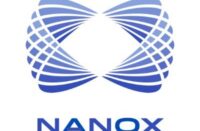Technology developed through partnership to monitor astronaut’s heart during ‘Rakia’ space mission
CHICAGO and TEL AVIV, ISRAEL, Sept. 30, 2021 /PRNewswire/ — UltraSight, a digital health pioneer transforming cardiac imaging through the power of AI, announced a new collaboration with GE Healthcare to conduct a cardiac study aboard the Axiom ‘Rakia’ space mission, and the successful completion of Preliminary Design Review (PDR) for Cardiac Point of Care Ultrasound (POCUS). During the study, UltraSight’s real-time AI guidance software and GE Healthcare’s handheld GE Vscan Air™, the high performance, wireless pocket-sized color ultrasound, will record images of an astronaut’s heart in microgravity.
The goal of this study is to demonstrate how, using the right technology, accurate, cardiac ultrasound images can be acquired anywhere – even in space – and how AI guidance has the potential to enable successful scanning with limited training. During the mission, Lt. Col. Eytan Stibbe, the first Israeli flying to the International space station, will use the Vscan Air™ ultrasound device with UltraSight AI guidance and take his own cardiac images, independent of trained medical professionals or ground mission control. The outcomes of this study could potentially benefit millions of cardiology patients worldwide, particularly in underserved communities where access to echocardiography labs and large medical systems is limited.
“Easy access to cardiac diagnostic imaging and a small and durable, wireless ultrasound device that can perform under arduous space conditions would be hugely important – it could allow the monitoring of space crews’ health and provide critical information on whether immediate intervention is necessary,” said Davidi Vortman, CEO of UltraSight. “Vscan Air™ fits the bill. We are excited to collaborate with GE Healthcare and lead a new wave of medical innovation in space.”
“Space agencies are looking for an ultrasound solution with the features provided by GE Healthcare and UltraSight not only for the international space station, but to also assist with upcoming missions including Artemis to the moon, and soon after to Mars,” said Eran Schenker, MD, Chief Innovation Medical Officer, Israeli Aerospace Medicine Institute (IAMI). “In fact, the mission to Mars, which will have significant communication challenges and delays, will require the rethinking of telemedicine. Real-time AI guidance will be critical in enabling the crew to obtain cardiac images without relying on mission control on Earth,” he concluded.
GE Healthcare pioneered the first color pocket-sized ultrasound, Vscan, in 2010 and has since continued to revolutionize the way clinicians use handheld ultrasound to see patients. To date, there are over 30,000 Vscan Family systems in the pockets of clinicians, impacting the care of more than 50 million patients worldwide. The Vscan Air™, launched earlier this year, increases access to precise care, helping improve workflow efficiencies and patient outcomes through dual-probe whole-body scanning capabilities and a user-friendly interface.
“The upcoming space mission aims to demonstrate the added value AI could have for Point of Care Ultrasound in providing flexible and timely access to diagnostic information anywhere and anytime,” said James Hurley, General Manager, Handheld Ultrasound at GE Healthcare. “From the farthest place you can imagine, which is space, to the primary and acute care settings in local communities worldwide, this technology plays a critical role in providing patients with accurate and timely diagnosis of cardiac conditions and other diseases.“
The ‘Rakia’ Preliminary Design Review was completed after the technology was presented to the Scientific Program Committee, Israeli Space Authority, Ramon Foundation and to Col. Stibbe. Its successful completion is a key milestone in the process of any project intended for space missions, as it identifies potential issues and ensures the design will help meet all space mission requirements.
After meeting UltraSight’s medical team and being introduced to the technology, Col. Stibbe said, “I am happy to play a role in testing medical innovation that has the potential to improve patient access to advanced medical care around the world. Even in 2021, too many people still do not have access to advanced healthcare. This is a step in the right direction.”
In May 2021, UltraSight was selected by the Israel Space Agency to conduct the cardiac study aboard the ‘Rakia’ space mission. The company chose GE Healthcare as a partner because of its R&D expertise and the high image quality of the Vscan Air™.
UltraSight is a partner in GE Healthcare’s Edison™ Developer Program, a dynamic ecosystem which helps innovators deliver advanced healthcare applications, integrate products, and drive commercial growth.
This is not the first time a GE Healthcare ultrasound device was used in space. In July 2011, GE Healthcare’s Vivid™ q cardiovascular ultrasound system was delivered to the International Space Station (ISS) on the Atlantis’ final space shuttle flight.
For more information about UltraSight and GE Healthcare’s involvement in the upcoming ‘Rakia’ space mission, contact Luna Newton at lnewton@lunapublicrelations.com.
*The UltraSight AI guidance software is currently pending approval for medical use in the U.S. and European markets.
About UltraSight
UltraSight aims to revolutionize cardiac sonography through the power of machine learning to enable more accurate and timely clinical decisions. The UltraSight automated guidance system and advanced usability features help bring the benefits of cardiac imaging to more healthcare professionals in new care settings, allowing patients access to ultrasound anywhere. In 2020, UltraSight won the TCT Innovation Competition, which took place during the Transcatheter Cardiovascular Therapeutics world conference. For more news and information, visit our website or follow UltraSight on LinkedIn and Twitter.
About GE Healthcare
GE Healthcare is the $18 billion healthcare business of GE. As a leading global medical technology, pharmaceutical diagnostics and digital solutions innovator, GE Healthcare enables clinicians to make faster, more informed decisions through intelligent devices, data analytics, applications and services, supported by its Edison intelligence platform. With over 100 years of healthcare industry experience and around 47,000 employees globally, the company operates at the center of an ecosystem working toward precision health, digitizing healthcare, helping drive productivity and improve outcomes for patients, providers, health systems and researchers around the world.
Follow us on Facebook, LinkedIn, Twitter, and Insights for the latest news, or visit our website www.gehealthcare.com for more information.
SOURCE UltraSight






